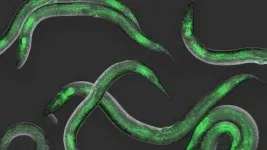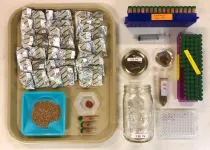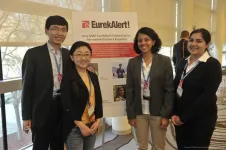(Press-News.org) There’s a rhythm to developing life. Growing from a tiny cell cluster into an adult organism takes precise timing and control. The right genes must turn on at the right time, for the right duration, and in the correct order. Losing the rhythm can lead to diseases like cancer. So, what keeps every gene on beat?
Cold Spring Harbor Laboratory (CSHL) Professor Christopher Hammell has found that in the worm C. elegans, this genetic orchestra has no single conductor. Instead, a quartet of molecules works in concert to time each developmental stage. Hammell says this process shares some similarities with the circadian clocks that control human behavior. Understanding how the worm’s clock is regulated could help explain how time affects development in other animals. Hammell explains:
“This clock we’ve discovered sets the cadence of development. It’s a coordinator of the orchestra. It controls when the trombone goes, how loud it gets, and how long the note lasts.”
Each stage of C. elegans’ development begins with two proteins, NHR-85 and NHR-23. They work together to spark a pulse of gene expression, switching on the microRNA lin-4, which controls stem cell development patterns. The pulse’s timing, strength, and duration depend on the short stretch when NHR-85 and NHR-23 interact, and another protein, LIN-42, which ends each developmental period by shutting off NHR-85.
“Mess up the orchestra—it’ll still make sound,” Hammell says. “But the way the music changes lets us know proper timing is critical for development.”
Hammell teamed with Wolfgang Keil from Paris’ Curie Institute to observe this gene expression cycle in action. C. elegans takes about 50 hours to reach adulthood. During that time, it’s always on the move, like a restless teenager. The team developed a new imaging technique to hold the tiny worm in place long enough to take pictures and video. This let them measure each developmental beat as it occurred.
“We could see every time genes turned on from birth to adulthood,” Hammell says. “This kind of imaging had never been done in animals, only in single cells.”
Hammell is now working with CSHL Professor & HHMI Investigator Leemor Joshua-Tor to image how clock proteins interact over time.
“We want to work out, with even more precision, how this clock operates,” Hammell says. “Humans can do things like write music or perform calculus, not because we have a calculus or music gene, but because our developmental clocks enable our brain to develop longer into a more complex organ.”
In other words, when it comes to development, time is truly of the essence.
END
These worms have rhythm
2023-09-08
ELSE PRESS RELEASES FROM THIS DATE:
Sleep-wake therapy gives new hope for teens with depression
2023-09-08
Sleep-Wake Therapy Gives New Hope for Teens with Depression
Promoting healthy sleep in teen night owls brings adolescents’ biology and school demands in alignment.
School systems aren’t built for kids who fall asleep and wake up late, the so-called “night owls,” which may help explain why this group of teens is more prone to depression.
Now, researchers at UC San Francisco have found a way to help these kids adjust to their natural sleep-cycle rhythms while still fulfilling their school responsibilities. The findings are a welcome sign for adolescents with ...
Study explores an underappreciated way warmer temperatures will impact ecosystems: Decomposition
2023-09-08
Our world is changing, and warming temperatures will alter our natural ecosystems. Some of these changes will be straightforward, like animal ranges creeping northward as they strive to maintain their ideal temperatures. But other changes will be more complicated, as warming sets off complex chain reactions that reverberate through these systems.
An important process in ecosystems is the decomposition of plant litter, in which dead plant material is broken down by animals, fungi, and microbes, making its nutrients accessible to the next generation of plants. How quickly this breakdown happens — the decomposition ...
UMBC team of data scientists named a tools competition winner
2023-09-08
Baltimore – A team of four data scientists from the University of Maryland, Baltimore County, was named today as one of 32 winners of the Tools Competition, one of the largest education technology (edtech) competitions in the world that awarded more than $4 million to winners this year.
The team was a winner in the DARPA AI Tools for Adult Learning opportunity, which sought artificial intelligence-powered tools to help adults learn complex topics necessary for the current and future national security workforce (e.g., AI engineering ...
Synchrotron studies change the composition of the Earth’s core
2023-09-08
In work published in Science Advances, a team of researchers have determined a new pressure scale, which is critical for understanding the Earth’s composition. Using x-rays from a uniquely powerful spectrometer at RIKEN’s SPring-8 Center they avoided some of the large approximations of previous work, discovering that the previous scale overestimated pressure by more than 20% at 230 gigapascals (2.3 million atmospheres) - a pressure reached in Earth’s core. This is similar to someone running a marathon that they thought was 42 kilometers, but finding they had only really run 34 kilometers. While 20% might seem like a modest correction, it has big implications.
An accurate ...
Applications now open for early-career Latin American science journalists to receive EurekAlert! Fellowships and attend the AAAS Annual Meeting
2023-09-08
The EurekAlert! Fellowships for International Science Reporters are back and now accepting applications from early-career Latin American science journalists. Two fellows will be selected to receive travel funding from EurekAlert! to attend the 2024 AAAS Annual Meeting, taking place February 15-17, 2024 in Denver, Colorado. Learn more about who is eligible and how to apply on our website. The application deadline is October 5, 2023 at 11:59 p.m. US Eastern Time.
The American Association for the Advancement of Science (AAAS) ...
British sex lives revealed in new study
2023-09-08
A new study published today shows the number of sexual partners we have changes as we age – and there are some surprising results.
Researchers from the University of East Anglia (UEA), in collaboration with King’s College London and University College London, surveyed more than 5,000 people aged 18 years and older during the 2022 mpox (previously known as “monkeypox”) outbreak.
The team wanted to better understand how sexual behaviours change with age, so that mathematical models of sexually transmitted infections can be made more accurate. Key findings included in the paper, published today ...
How trees influence cloud formation
2023-09-08
As part of the international CLOUD project at the nuclear research centre CERN, researchers at PSI have identified so-called sesquiterpenes – gaseous hydrocarbons that are released by plants – as being a major factor in cloud formation. This finding could reduce uncertainties in climate models and help make more accurate predictions. The study has now been published in the journal Science Advances.
According to the latest projections of the Intergovernmental Panel on Climate Change (IPCC), the global climate will be 1.5 to 4.4 degrees Celsius warmer than pre-industrial levels by 2100. This figure is based on various scenarios describing how anthropogenic ...
Rice helps lead national quantum computing research efforts
2023-09-08
HOUSTON – (Sept. 8, 2023) A team of Rice University researchers have won a 4-year, $1.2 million grant from the Department of Energy (DOE) to evaluate the strengths and limitations of different physical systems used to build quantum computers.
Nai-Hui Chia, Kaden Hazzard and Kevin Slagle will use theory, numerical simulations and quantum hardware-run algorithms to provide a framework for comparing the viability and computational potential of different approaches to building quantum computers to help achieve near-term advances in quantum computing. Their project is one of six selected by the DOE “to improve our understanding of whether, when and how quantum ...
Medical Care publishes article collection on integrating evidence-based programs into clinical practice
2023-09-08
September 8, 2023 — As part of its partnership with the Patient-Centered Outcomes Research Institute (PCORI), Medical Care has published its first PCORI-sponsored article collection, which provides specific information about the costs that healthcare systems can expect to incur in promoting the uptake of specific evidence-based programs. Medical Care, https://journals.lww.com/lww-medicalcare/pages/default.aspxthe official journal of the Medical Care Section of the American Public Health Association, is published in the Lippincott portfolio by Wolters Kluwer.
In the September issue, five project teams that received Implementation Award funding from PCORI ...
Exiting the pandemic together: achieving global immunity and equity
2023-09-08
“While vaccination has been successful for the general population, it is crucial not to overlook the needs of immunocompromised individuals.”
BUFFALO, NY- September 8, 2023 – A new editorial paper was published in Oncoscience (Volume 10) on September 1, 2023, entitled, “Exiting the pandemic together: achieving global immunity and equity.”
In this new editorial, researchers Yuxin Ying, Jola Bytyci and Lennard YW Lee from Oxford Medical School discuss their recent investigation into the effectiveness of ...






